Victory to Defeat: The British Army 1918-1940
Insight from the Author, Dr. Robert Lyman, MBE and FRHistS
The Military Reading Room is thrilled to introduce the Visiting Author’s Corner, a space dedicated to showcasing exceptional works from our community that offer unique perspectives, deepen our appreciation for history and strategy, and provide thought-provoking insights. We are honored to feature Dr. Robert Lyman as our inaugural visiting author.
Dr. Lyman and Richard Dannatt’s outstanding examination of the British Army’s decline in the post-Great War era and its devastating unpreparedness for war in 1939 is both insightful and profoundly relevant to the challenges of today. In this post, Dr. Lyman shares the inspiration behind his book and offers a fascinating glimpse into the lessons uncovered during his research; we invite you to join us in exploring his remarkable contributions.
Please tell us a bit about your background and your experiences.
I’m Dr Robert Lyman, a Member of the Order of the British Empire (MBE) and a Fellow of the Royal Historical Society (FRHistS). Since retiring in 2001 from the British Army after a 20-year career, I have been a writer and historian publishing widely on the Second World War in Europe, North Africa, and Asia. I am Field Marshal Bill Slim’s military biographer, was the BBC’s historical adviser for the VJ commemorations in 2015 and 2020, and am a regular contributor to documentary films on aspects of the war. I have collaborated with General Lord Dannatt to write two books. Victory to Defeat, The British Army 1918-1940, published in 2023, and Korea, War Without End, to be published in May 2025.
How would you summarize your book From Victory to Defeat”?
The book explores the British Army's dramatic journey from being a victorious force in 1918 to a catastrophically unprepared and poorly equipped institution by 1939. The narrative delves into the broader societal, political, and military failures that contributed to this decline. It highlights how the lack of a clear strategic direction, economic stringency, and political naivety left the Army vulnerable and ill-prepared for the challenges of World War II. The book underscores the crucial lessons from this period and their relevance to contemporary military strategy.
What was your inspiration for writing it, and why it holds significance for you?
A shared concern between myself and my co-author, General Lord Richard Dannatt, about the British Army’s ability to adapt and prepare for future challenges inspired us to write this book. What puzzled us was why the British Army in 1939 was caught so woefully unprepared when it had been such a formidable force in 1918. We aimed to explore the reasons behind the Army’s interwar years decline in warfighting capability and draw parallels to contemporary challenges, emphasizing the importance of readiness and strategic foresight. As career soldiers, we knew that the British Army had been caught napping in 1939 and had spent four years having to create a fighting capability able to defeat the Wehrmacht. This was the reason we set out, in 2020, to write Victory to Defeat. Together, we were worried about the shift in thinking about today’s British Army in the UK that suggested that all we needed in the future was the ability to fight counterinsurgency (COIN). In our view, the reason why the British Army had been able to fight COIN in the past was because of its preparedness to fight conventional war. Lose the ability to do the latter, and all you can then do is the former. Worried that Britain was about to make the same mistakes it had made in the 1930s, Richard and I got to work. We felt at the end of it that we could trace a direct line between the creation and the loss of a warfighting capability – that is, the ability to fight highly intensive combined arms war against a peer adversary. What’s more, we felt we were able to trace the reasons for this decline and its consequences.
What insights and lessons can you share about your study of the British Army’s journey between 1918 and 1940? Are those insights relevant to the British Army’s challenges today?
In our research, we identified five primary causes of the decline of British military effectiveness in 1939.
No clear strategic plan for the Army. Strategies are determined by having a clear understanding of who a future enemy might be and how it might threaten our interests. Following the end of the Great War, until the late 1930s, no one seemed bothered to define this essential point of direction. There was a remarkably inadequate grand strategic conversation (i.e., at a national, governmental level) about the purpose, structure, and nature of the Army. This was a problem because it meant that Britain was unable to determine the precise structure its armed forces needed to be and its cost. Was the focus of the army to be the continent, or the Empire, or both? As a result, the last known plan reasserted itself – Imperial defence, à la 1914. This meant that the army wasn’t structured or equipped to fight a specified enemy in a defined set of circumstances. Instead, the British Army and its cousin, the Indian Army, was expected to be a generic jack-of-all-trades, without the structure, doctrine, training, or equipment to fight the type of war it had become the master of in 1918. There was no operational design for the British Army derived directly from an analysis of the threat it faced. The British Army wasn’t prepared to fight a first-class European Army in 1939 for the simple reason that Britain hadn’t prepared itself to do so. Likewise, when it came to fighting the Japanese in 1941 and 1942 in Malaya and Burma, the British found it failed to prepare adequately, and it had no idea as to how to fight the Imperial Japanese Army. There were two connected failures here. The first was one of strategic preparedness, the blame for which was both governmental and strategic. The second was of training, doctrine and military preparedness by the British Army in Europe and Asia to fight.
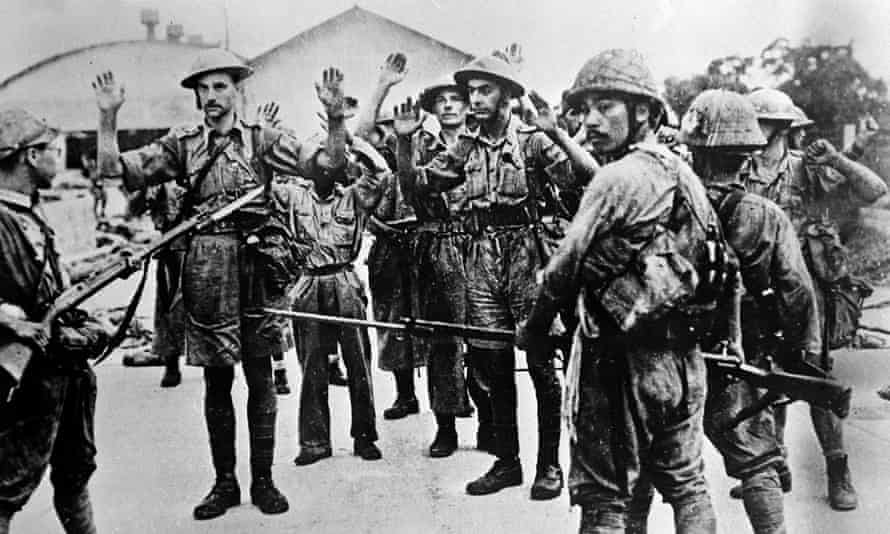
Britain was unprepared both politically and culturally for another war so soon after the last. In 1919 the country seemed to want to look backward to embrace the days of peace that had preceded the cataclysm of war, to drape itself with Edwardian comfort. The country looked to itself and to its Empire, eschewing the complications of commitments on continental Europe that had recently resulted in the loss of so much blood. The losses sustained in the Great War resulted in the overwhelming national sentiment that war must never again be undertaken as a form of politics. Clausewitz was dead. Part of this sentiment evidenced itself in the rise of pacifism. In the army, a pervasive belief existed that the Great War was an aberration and nothing like it would again afflict Western civilization. Any lessons from the war were therefore irrelevant to the future structures or doctrine of the British Army, for whom the defence of the Empire was the crucial issue. But whether it liked it or not, the world was changing fast, in ways that Britain struggled to comprehend and from which it could not ultimately escape.
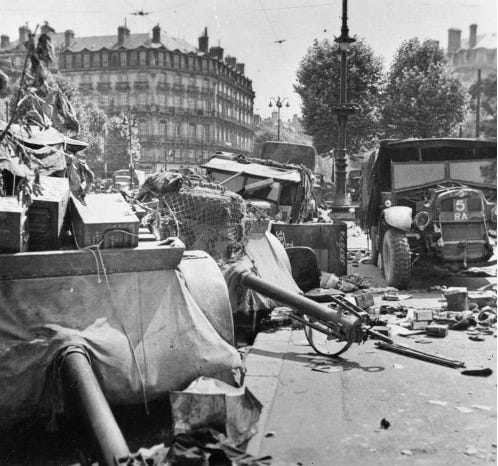
Failure to capture the reasons for operational success in 1918. The dramatic reduction in troop numbers at the end of the Great War meant that those best able to convert the learning from 1918 into doctrine left for civilian life, taking their knowledge and experience with them. It was never recovered. There was, therefore, no template in the years afterward on which to build a successful military doctrine based on the successful warfighting experience that had culminated in the victories of 1918.
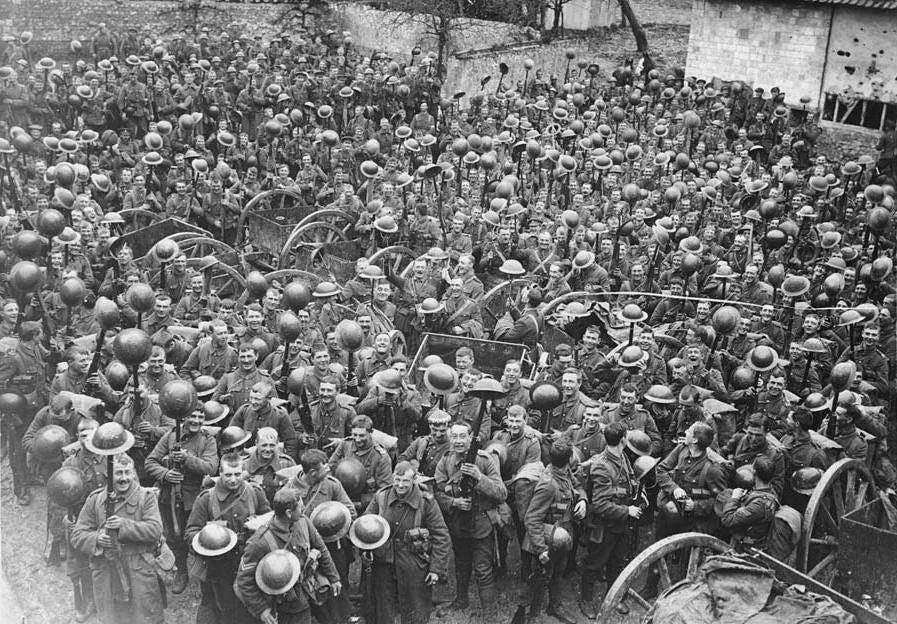
Several hundred soldiers are smiling, cheering, and waving—some with their helmets in the air on the ends of their rifles. It is probable that this was taken when the Armistice was announced on 11 November 1918. (Public domain photo courtesy Picryl.com). 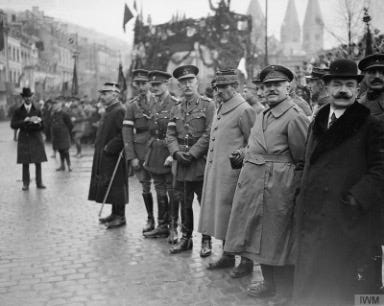
The Surrender of the German Army on the Western Front, November 1918. The Armistice Commission in Spa. Lieutenant General Richard Haking (British), General Alphonse Nudist (President and French Representative), and General Hector Delobbe. November 1918. (Public domain photo from Picryl.com) Political naivety led to a dramatic economic stringency being applied, including the underlying Treasury assumption in the early 1920’s of the ‘Ten Year Rule’, an assumption that kept rolling over, year after year. This meant that there wasn’t enough money to do what was necessary to protect British interests from impending harm. The Army butter was thinly spread on the imperial bread, with the result that insufficient investment was made in the core of the army’s warfighting capability. This stringency was exacerbated by the impact of the Great Depression at the end of the 1920s into the early years of the next decade.
A new global instability was caused by the rise of a new breed of irrational actors – in Germany, Italy, and Japan – which overturned previously held notions of diplomacy and state behavior. Britain was unprepared for this type of political discombobulation, with a form of European politics never seen before, driven by racist ideology rather than rational statecraft, especially on the continent but also in Asia Pacific. Who could have foreseen the rise of irrational national actors prepared to lead their people into a populist (and racist) doom? Certainly, no published strategic assessments in Britain during this period understood this frightening development and had not prepared for the military manifestation of such ideas.
As a consequence of these factors, the British Army was left to muddle through without clear political direction and, therefore, without its own clearly articulated firm direction. With no grand strategic direction, the War Office and Chiefs of Staff were unable to create the necessary military strategy to define the purpose of the Army and so direct it accordingly. This doctrinal vacuum allowed competing visions for technology, doctrine, and equipment to be endlessly debated and for there to be no effective plan for the realistic equipping and training of the Army in the particular tasks it would need to undertake in the next war. This was a situation in which the army allowed itself to become intellectually moribund, boring, and regimental, and a home for the uninquisitive. As a consequence, the quality of military leadership was poor.
It raises a fascinating question. Could Britain have prevented the Second World War if it and its armed forces had been better prepared? If Britain and her army, after 1919, had retained a capability able to take on a sophisticated peer adversary in Europe, and if its government had similarly retained a willingness to preserve the peace on the continent using the type of military deterrence exercised following 1949 against the USSR (via NATO), could the Second World War have been averted? Hitler and his Wehrmacht were nervous about possible British and French reactions to the illegal reoccupation of the Rhineland in March 1936. France and Britain did nothing, directly encouraging Hitler’s territorial ambitions elsewhere in Europe. The British Government could not threaten the Germans with something it did not possess. The impressive capability it had boasted in 1918 no longer existed. The rest is history, but too many lessons from this period are too profound to be ignored in our present day. Even a casual glance at the British Army today raises the issues that this cautionary tale posits.
The primary lesson from this period is that the country must have a clear and unambiguous grand strategy; and for capable and effective military authorities to be able translate this direction into a military strategy that structures, equips, and trains its armed forces to fight the country’s foes.
The stark message of the two decades between the world wars is that we neglect to understand who our enemy might be and how to defeat him at the peril of our country. Our book is not just about the failure of an army but the failure of political and military leadership of a profound kind. It is the sort of failure we recognize in our contemporary political environment, and it worries us. It is the story of the decline of an army from the triumph of victory in 1918 to defeat in 1940. It should be a salutary warning to us all, if only we had the ears to hear.
When was your book published, and where can readers purchase it?
Victory to Defeat was published in 2020. It is available for purchase on Amazon and most major book-selling platforms. Here is a link to Amazon: Victory to Defeat
Where can readers learn more about your work?
Readers can find more about my work on my Substack page https://substack.com/@drrobertlyman and my Substack Newsletter, The War Room, where I regularly share commentary on my historical and current military matters. You can also find more on my books and other projects on my personal website, https://robertlyman.com
Was this post helpful in introducing you to a new book that sparked an interest?
Let us know if this book makes it onto your reading list.
Tags: New Reads, World War 1, Visiting Authors, Defense Strategy
Our simple request:
If you liked this post and wish to see more like it, click the heart below.
If you have personal experience or have an idea or opinion to share, we would love your comment.
If you have an idea for improving it, please let us know in a comment.





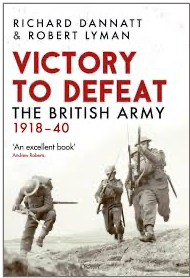
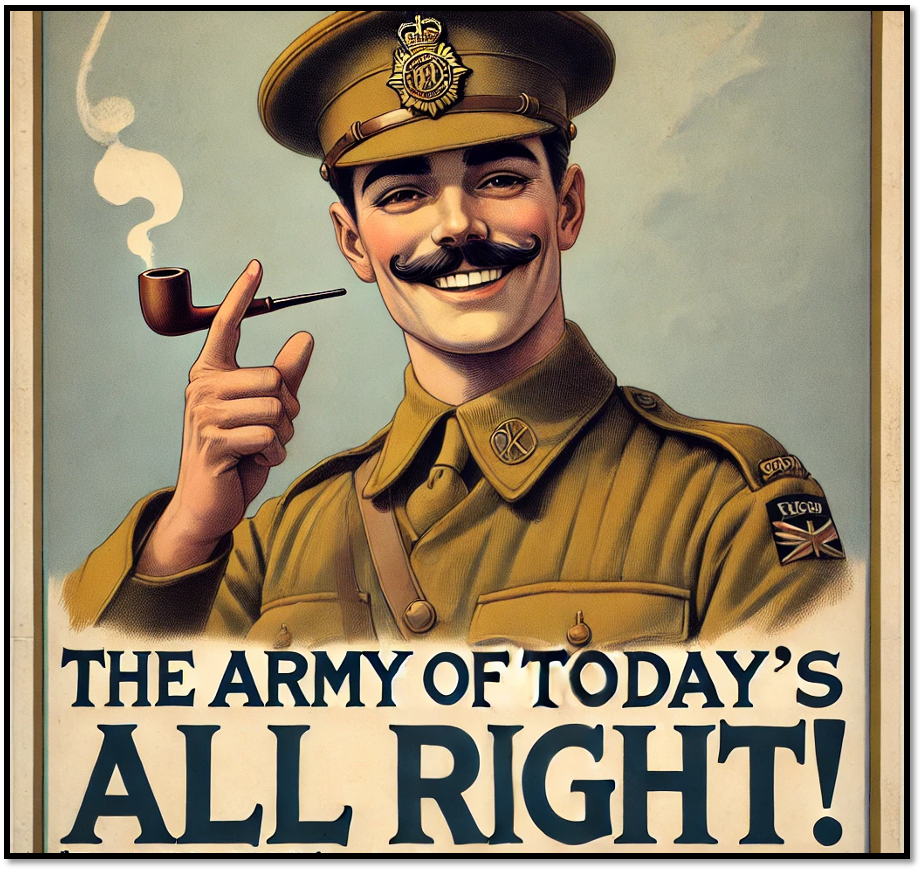
I can't wait to read this! Always fascinated how the B.E.F. was never given the proper credit for learning enough of combined arms warfare by 1918 to defeat the German Army. Most American's will claim A.E.F. involvement as turning the tide, but it was the British Army that won the war in 1918 in my opinion.
It's an exceptional book. I read this last year. Excellent insights and one of the few books to go into much-needed detail of just what was happening between the wars. Shocked at the lack of 'lessons learnt' from 1918 to 19340. It has prompted me to delve more into the '100 days campaign' and brought my World War 1 knowledge out of the muck of the Somme and into greater clarity of the conflict as a whole. Highly, highly recommended 👍